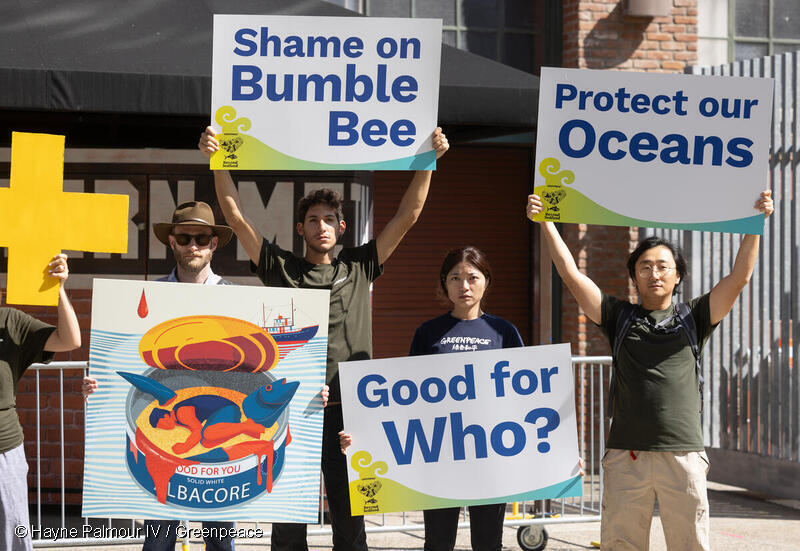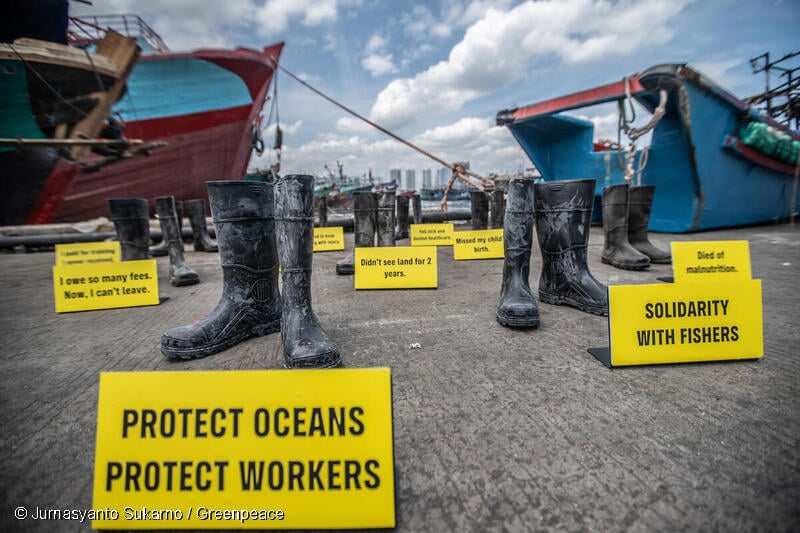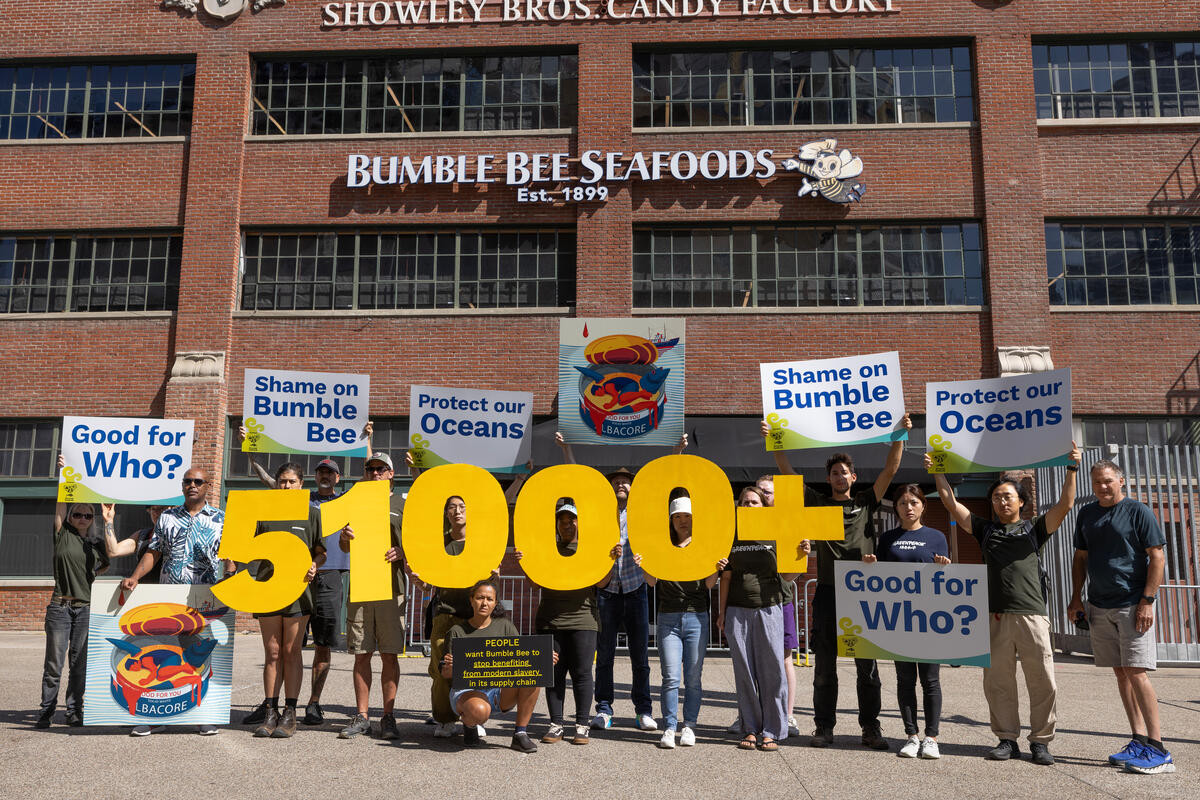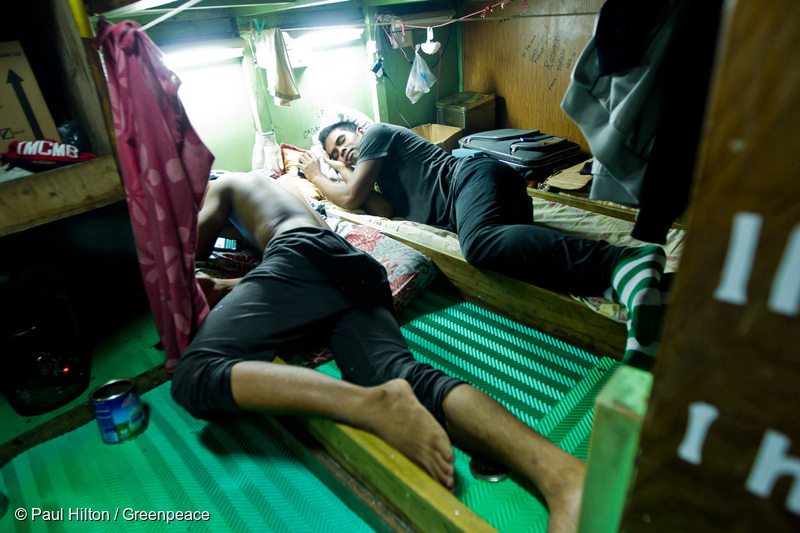Petition with over 51,000 signatures delivered to company’s headquarters
Today, Greenpeace USA delivered a petition with over 51,000 signatures calling on Bumble Bee and its owners, Fong Chun Formosa (FCF), to stop sourcing from ships that exploit workers and our oceans. Activists hoisted banners in front of the company’s headquarters that read “End Modern Slavery” after marching to Bumble Bee from the Greenpeace Ship Arctic Sunrise, docked at the pier in San Diego. The Arctic Sunrise is in California to launch a major new global campaign calling on world leaders to ratify the Global Ocean Treaty and protect 30 percent of the oceans by 2030.

Petition with over 51,000 signatures delivered to company’s headquarters
Today, Greenpeace USA delivered a petition with over 51,000 signatures calling on Bumble Bee and its owners, Fong Chun Formosa (FCF), to stop sourcing from ships that exploit workers and our oceans. Activists hoisted banners in front of the company’s headquarters that read “End Modern Slavery” after marching to Bumble Bee from the Greenpeace Ship Arctic Sunrise, docked at the pier in San Diego. The Arctic Sunrise is in California to launch a major new global campaign calling on world leaders to ratify the Global Ocean Treaty and protect 30 percent of the oceans by 2030.

San Diego, CA (September 7, 2023) – Today, Greenpeace USA delivered a petition with over 51,000 signatures calling on Bumble Bee and its owners, Fong Chun Formosa (FCF), to stop sourcing from ships that exploit workers and our oceans. Activists hoisted banners in front of the company’s headquarters that read “End Modern Slavery” after marching to Bumble Bee from the Greenpeace Ship Arctic Sunrise, docked at the pier in San Diego. The Arctic Sunrise is in California to launch a major new global campaign calling on world leaders to ratify the Global Ocean Treaty and protect 30 percent of the oceans by 2030. The oceans desperately need respite from overfishing and other pressures if they are to recover. Ahead of the march, Greenpeace USA invited senior Bumble Bee leaders to meet privately. They declined the invitation, citing a scheduling conflict. They also refused to meet the activists to receive the petition.
Tefere Gebre, Greenpeace USA’s Chief Program Officer, said: “Bumble Bee has positioned itself as a champion for sustainability and advocate for fishers, while also ignoring the very real suffering of the workers in its supply chain and the environmental impact of harmful fishing practices. Years of investigation and reporting by the Greenpeace network seriously challenge Bumble Bee’s claims. It is unconscionable that fishers must risk modern slavery, abuse, and even death while trying to make a living for their families. Today, we delivered a message from over 51,000 people that Bumble Bee can’t ignore. Bumble Bee has the power and resources to do better for these workers and the oceans we all rely on, and we are calling on them to take action now.”
A 2022 investigation by Greenpeace East Asia found that over 10 percent of the 119 sampled Taiwanese-flagged or owned ships that supplied Bumble Bee had previously violated Taiwan Fishery Agency (TFA) regulations and were on their Illegal, Unreported, and Unregulated (IUU) list. The report also found that some ships supplying Bumble Bee had reportedly engaged in illegal fishing and shark finning, a process where sharks are caught, fins are removed, and the body is discarded at sea.
Greenpeace USA discovered a canned Bumble Bee product at a Harris Teeter grocery store in Arlington, Virginia, which contained fish from the Da Wang, a ship that US Customs and Border Protection recently confirmed to have used forced labor. This raised concerns about the number of potentially contaminated products on US supermarket shelves. Several fishers who worked aboard the ships supplying Bumble Bee reported working excessive overtime hours while having their wages withheld. Others stated that their documents were retained, a forced labor practice sometimes used by ship operators or manning agencies to deter or prevent fishers from leaving or terminating their contracts early.
Sari Heindenreich, Greenpeace USA’s Senior Human Rights Advisor for Global Fishing, said: “The issue of forced labor and environmental destruction in the Bumble Bee supply chain is a longstanding one. For more than a decade, Greenpeace USA has tried to engage Bumble Bee in discussion about the areas where they are falling short and how they can take a systematic, human rights- and science-based approach to addressing those issues. The corporation has repeatedly refused to even meet with us. For each day that passes without action, fishers in the seafood supply chain are working in brutal and inhumane conditions, and our oceans deteriorate.”
Heidenreich continued: “American consumers have made it clear—they don’t want to feed their families with products made with illegally caught seafood, made with human rights and labor violations, or at cheap prices that come at the cost of a healthy ocean. We are tired of incremental changes that don’t actually clean up their supply chain. Bumble Bee must do a better job of living its claimed values by taking bold and immediate action to lead a significant transformation in the seafood industry.”
On Tuesday, Bumble Bee employees were invited to attend a private screening aboard the Arctic Sunrise of the documentary Before You Eat. In the film, migrant fishers tell their stories of being made to engage in illegal fishing and suffering human rights abuses, such as excessive working hours and lack of adequate food and nutrition. The documentary was executive produced by Arifsyah Naution, Greenpeace Southeast Asia’s Oceans Campaign Lead, in collaboration with the SBMI, the Indonesian Migrant Workers Union. This was the first time the film was screened outside of Indonesia, where it was produced.
Yuton Lee, Greenpeace Taiwan’s Ocean Campaigner who was present for the petition delivery, said: “Bumble Bee and its Taiwanese owner, Fong Chun Formosa (FCF), are some of the biggest players in the global seafood supply chain. They have power and influence they can leverage to make substantive changes in the industry’s notoriously murky seafood supply chain. But while their profits grow, they have done little to change the situation. It can’t be business as usual while people suffer. Today, we send a message loud and clear to Bumble Bee and FCF: The time to change is now.”
The value of the global tuna industry in 2022 was $41 billion and is expected to reach $51 billion by 2030. The U.S. is the world’s second-largest importer of seafood, next to the European Union, and is one of the largest consumers of canned tuna globally. Many tuna stocks have dramatically decreased over the last few decades as consumption has increased. The latest estimates by the “FAO’s Status of World Fisheries and Aquaculture Report” show that as of 2019, about a third of the tuna commonly caught for commercial purposes were being fished in a way that harms their population and is not good for their long-term survival.
The distant-water fishing industry has a long history of exploiting not just our oceans but also people. They serve to reinforce each other as the diminishing fish stocks mean ships must travel further out to sea for increasingly longer periods, where the isolated fishers are more likely to experience human rights abuses. Transshipment–wherein a refrigerated ship meets the fishing ship at sea, collects the fishing ship’s cargo (catch), and returns it to port—extends the voyages at sea for months, worsening the isolation and ripening the conditions for abuse.
Photos and videos are available here.
###
Greenpeace USA is part of a global network of independent campaigning organizations that use peaceful protest and creative communication to expose global environmental problems and promote solutions that are essential to a green and peaceful future. Greenpeace USA is committed to transforming the country’s unjust social, environmental, and economic systems from the ground up to address the climate crisis, advance racial justice, and build an economy that puts people first. Learn more at www.greenpeace.org/usa.



